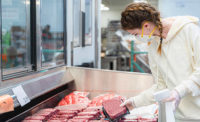2020 Food Safety Report | 3 Bold Predictions

The future is an unpredictable place. As such, we generally prefer to leave predictions to others. We would be reluctant to break our no-prediction rule even in the most stable times, when little in the way of change is expected. Given that, who would ever predict that we would be here making predictions about the meat industry during a presidential election year, amidst a 12-year bull market, while the U.S. is fighting trade disputes disproportionately affecting agricultural interests, as disruptive technologies and socio-cultural shifts have ushered in the most dynamic commercial environment in history?
Yet, here we are. What could go wrong, and what will 2020 deliver? Here are our boldest predictions.

Table of Contents:
The explosive growth of the plant-based and lab-cultured meat industries may slow significantly as the novelty of these products wanes and consumers go back to meat.
In 2019, plant-based meat companies such as Impossible Foods dominated the discussion so much it was hard to believe the industry was virtually unknown just a few years ago. Today, annual revenues for these products are reaching into the billions. Despite the recent growth, the popularity of plant-based meat products has been driven in large part by consumer curiosity. And though the products are much more meatlike than they were in years past, consumers can still tell the difference. Having tried the products, consumers will likely return (at least temporarily) to the real thing. Though it is impossible to tell what the future holds, the downturn may be short-lived as attitudes shift, technology improves and plant-based meat companies devise new ways to improve their products.
The U.S. Department of Agriculture’s Food Safety and Inspection Service (FSIS) may declare certain Salmonella serotypes as adulterants in raw meat and poultry.
In recent years, doctors and scientists have increasingly sounded the alarm over the rapid emergence of antibiotic-resistant pathogens. For decades, antibiotics have served humanity magnificently. Early on, some even believed the threat of disease would soon come to an end. Unfortunately, pathogens have learned to fight back and many are now resistant to most known antibiotics. This presents an extraordinarily dangerous and vastly underappreciated threat to public health. That will likely change. At least partially in recognition of the risks posed by antibiotic-resistant Salmonella, FSIS has been asked to declare certain strains of antibiotic-resistant Salmonella to be adulterant in raw meat and poultry.
The number of FSIS Class I recalls may decrease by at least 20 percent.
Trying to discern whether food is getting safer can be difficult because even as our interventions improve, so does our ability to identify illnesses and outbreaks and trace them to specific products. This has led to a strange dynamic. Food is safer than ever, but the number of illnesses and outbreaks remain static because surveillance is better. There are fewer illnesses, but more of them are identified. After years of relative stalemate, this year may be different.
Having continually learned and improved for many years, the meat industry is poised to see the fruits of its labor truly pay off. Consequently, as safety improves, the number of Class I recalls may fall by 20 percent or more.
Whatever this year has in store, we hope it will bring each of you all the success, health and happiness you deserve. Predicting the future may be a fool’s errand, and whether any of our bold predictions will bear out remains to be seen.
In terms of not-so-bold predictions, I do predict I will be grilling real steaks, burgers and sausages as soon as summer arrives. Thanks to all of you all for making that possible. NP
Looking for a reprint of this article?
From high-res PDFs to custom plaques, order your copy today!






